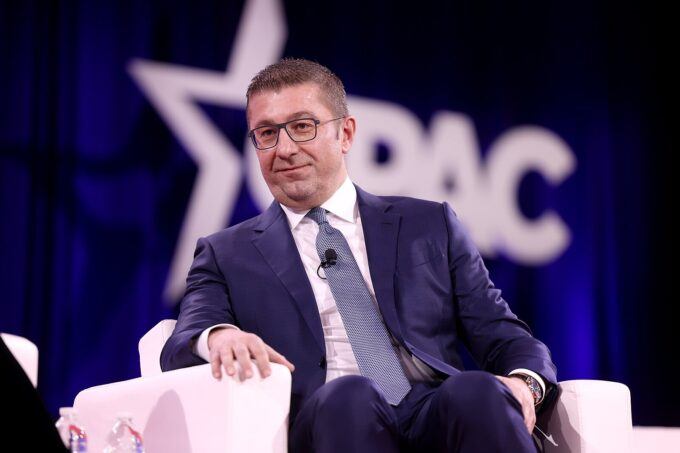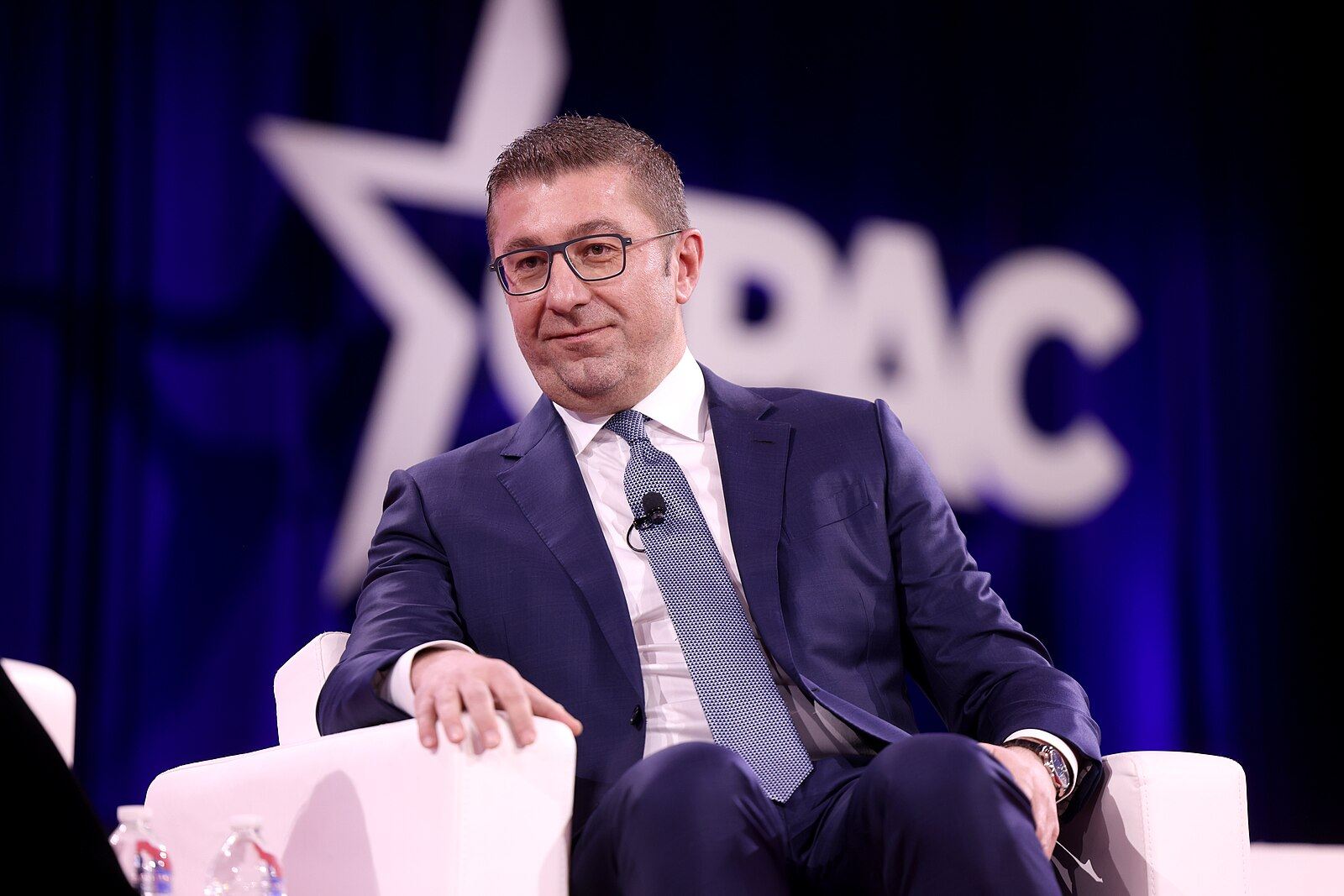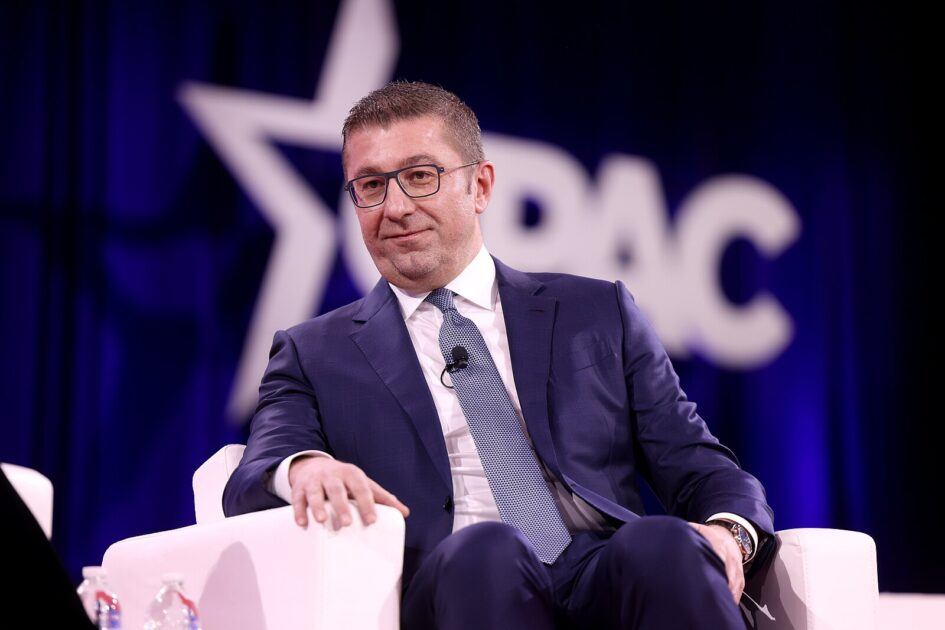






























































Prime Minister of North Macedonia Hristijan Mickoski speaking at the 2025 Conservative Political Action Conference. Photograph Source: Gage Skidmore – CC BY-SA 2.0
The West has long cherished political correctness as though it were a core democratic value. This drive to ‘civilise’ public discourse has been especially aimed at illiberal democracies or post-socialist societies that are still expected to become ‘true democracies’. One of the crowning achievements of this campaign has been the suppression of radical critique, particularly of capitalism and liberalism, and the normalisation of hypocrisy and even self-censorship.
While grants and ‘soft power’ projects flowed abundantly toward the East and Global South, the West itself was unravelling. It quietly abandoned the very values it claims as its civilisational hallmarks. This is now happening on both sides of the Atlantic, but nowhere is the change more glaring than in Washington, D.C. Since Donald Trump returned for his second term, political correctness has not just been questioned – it has been thrown out the window, much like Ukrainian President Zelenskyy, who was unceremoniously kicked out of the White House.
Still high on the (anticipated) triumph of Liberation Day, Trump recently explained – using the crudest possible language – how foreign leaders must debase themselves to get tariff exemptions from the US. The tariffs are now gone, but the memory of the vulgar metaphor still stings many leaders like a slap across the face. In its wake came another jarring statement – this time from Vice President JD Vance, who spoke disparagingly of ‘Chinese peasants’, a racist comment that only intensified the perception that the US is waging war against everyone, especially China.
But how does all this turbulence affect Macedonia? The citizens here are no puritans. They’ve long grown used to leaders boasting about things others would be ashamed of – like the former prime minister who once bragged before a foreign audience that he had the ‘balls’ to sell out the country’s national interests. Another played an ‘all-in’ game with national symbols. The current prime minister recently had his own subservient moment in Washington, reminiscent of those old, humiliating scenes.
But there’s a difference between merely witnessing such submissiveness and publicly naming it. Doing the latter cost me my long-standing columnist position after nearly two decades, despite never sparing any government from criticism. During Yugoslav times, there was a song: ‘Comrade Tito, we swear to you we will never stray from your path’. Today, the tune remains the same, but the comrade’s name is Trump.
Macedonia got a new government less than a year ago, but political correctness remains firmly in place. Nothing’s changed – only the faces. The effects of the so-called ‘Colourful Revolution’ that brought down former conservative PM Nikola Gruevski still shape the country. His successor, Hristijan Mickoski, appears terrified of (if not paranoid about) criticism – even with a strong electoral mandate. The safest position is silence, especially when it comes to critiquing the prime minister. You are allowed to light candles for the victims of a deadly nightclub fire in Kočani – but heaven forbid you protest, or you’ll be accused of being a leftover ‘colourful revolutionary’ trying to overthrow the government. Any attempt at serious public or intellectual debate is dangerous terrain – best avoided altogether.
Under the previous Social Democratic government – installed through a mix of foreign pressure, a liberal ‘woke’ agenda, and protest movements – a ‘real’ intellectual was defined as someone stripped of national or patriotic sentiments. Under the new conservative administration, the script has been flipped. National pride is now encouraged, even though few things in the country warrant pride. But the nation has become synonymous with the state, and the state with the ruling party. If you want to be ‘in the game’, you must align yourself with the prime minister, the ‘father of the nation’ (even though the president, a woman, was previously promoted as its ‘mother’).
A few examples illustrate the new (conservative) political correctness. First, censorship now goes by a new name: ‘legal advisors’. These are lawyers allegedly hired to help editorial teams avoid lawsuits, but in practice, they filter what can and cannot be published. Even columnists face this gatekeeping. Second, front-page headlines now question: ‘Why are some intellectual circles spreading defeatist scenarios in public discourse?’ As if being honest about the state of the country is somehow anti-patriotic. But what else should one spread in a nation drowning in corruption, cronyism, poverty, and rampant partisanship? Euphoria?
Perhaps the most ironic example of institutionalised political correctness comes from academia and civil society. Consider a British Embassy–funded project led by a local academic institution, titled ŠTET-NA (a portmanteau of the Macedonian words for ‘harmful’ and ‘narratives’), translated into English as HARM-TIVE. The project’s purpose? To regularly screen and analyse harmful political narratives – statements, stories, and ideas allegedly detrimental to democracy, public well-being, or trust in institutions. One might think Macedonia is a peaceful utopia, a thriving democracy undermined only by mean-spirited speech. Instead of critiquing actions, the focus is on controlling narratives.
According to the project’s official description, ‘undermining trust in institutions and media (without evidence)’ is categorised as a harmful narrative. Another ‘harmful narrative’ is ‘unfounded accusations of foreign interference’ – a clear reference to any questioning of NATO or EU influence in the country’s internal affairs. The project also condemns ‘encouraging extreme patriotism and nationalism’ and ‘creating a common enemy’ – even as virtually all major national decisions in recent years have been made under foreign pressure and with fearmongering tactics (‘Give up your national interests, or the state will collapse!’). Ironically, these are the very narratives pushed by the same donors now sponsoring ‘HARM-TIVE’.
This is a country where people die from corruption and negligence. Public trust in the judiciary is only 2%. The other institutions don’t fare any better. The prime minister behaves like a one-man state: the legislature, the judiciary, and the executive branch. He hurls insults at MPs and experts, waves around documents from ongoing investigations (which he shouldn’t even possess), and the media barely dare invite dissenting voices to speak. But funding is funding, and the HARM-TIVE project began under the previous government – it’s simply finishing now. Unsurprisingly, its implicit target is the only real opposition: the far-left party, which, by its very nature and ideological orientation, is anti-establishment. Its leader often quotes Robespierre, which, frankly, is still more fitting than quoting Trump.
Political correctness remains a constant. It’s a container – only the contents shift. The media and NGOs adapt like chameleons, mostly according to donor priorities. Any opinion that sounds bold, open, or off-narrative is swiftly labelled ‘hate speech’. Journalists now fear that such speech is the death of political correctness. In truth, we’re dying from political correctness and obedience when we should be raging.
The elites want us to believe that political correctness means good manners, polite words, and fair play in a battle between David and Goliath. But in Macedonia, this sanitised correctness renders us deaf, blind, and mute in the face of collapse. What we lack is resistance, not refinement. Anyone unwilling to tell painful truths just because it might upset a zombified, apathetic population and a scared government is complicit. Orwell was right: telling the truth in a time of universal deceit is a revolutionary act.
The post A Time of Living Dangerously – For Telling the Truth appeared first on CounterPunch.org.
This content originally appeared on CounterPunch.org and was authored by Biljana Vankovska.